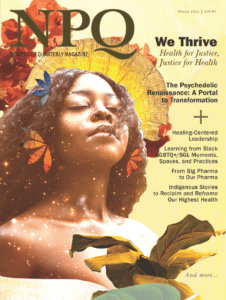
May 5, 2020; Colorlines
The winners of the Pulitzer Prize were announced this week, and they made headlines for several reasons other than their prestige. Multiple nonprofits were honored, and the prize committees declared through their honorees a commitment to a national conversation about racial justice.
Three nonprofit media outlets were honored in journalism:
- ProPublica won in two categories. A collaboration with for-profit Anchorage Daily News on police neglect of Alaskan villages won for Public Service. In National Reporting, T. Christian Miller, Megan Rose, and Robert Faturechi won for their investigation into naval fleet crashes in the Pacific.
- Jay Hancock and Elizabeth Lucas of Kaiser Health News were finalists in Investigative Reporting for their work on predatory bill collection by the University of Virginia Health System, a story that NPQ followed closely.
- Reveal, a project of the Center for Investigative Reporting, won for reporting on “worker injuries and the human toll of robotics technology at Amazon warehouses”—a topic that seems prescient considering all the labor unrest surrounding Amazon at this time.
The winners are notable not just for the remarkable public service of their reporting, but for the trends they reveal. Although nationally distributed publications like the New York Times, Washington Post, and Reuters all won at least one category, a number of prizes went to local outlets for local reporting. The Los Angeles Times, St. Louis’s Courier-Journal, Texas’ Palestine Herald-Press, and the Baltimore Sun—which itself may go nonprofit soon—were all winners. Studies have noted how, especially during a crisis like COVID-19, people generally have greater trust in their local outlets and rely on them to tell the real story; papers have rewarded that trust with some outstanding work.
Pulitzer selections this year spoke to issues much bigger than media consumption. In the US, the Pulitzer committees honored the work of many Black Americans and specifically chose work that spoke to the history and impact of systemic racism in the US. Colorlines’ N. Jamiyla Chisholm wrote, “The 2020 Pulitzer Prizes honor work that centers people of color.” Nikole Hannah-Jones, the New York Times reporter who launched the 1619 Project, tweeted,
Ida B. Wells & I were awarded the Pulitzer on the same day. How can I not believe that the ancestors intervened on this moment? I’ll say more later. For now I will sit in the truth of how she, how they, cleared a path for me, how they endured so that I & the #1619Project could be.
Sign up for our free newsletters
Subscribe to NPQ's newsletters to have our top stories delivered directly to your inbox.
By signing up, you agree to our privacy policy and terms of use, and to receive messages from NPQ and our partners.
Jones, who goes by the name “Ida Bae Wells” on Twitter, won the Pulitzer in Commentary for her work last year. (The Pulitzer Center, which was a collaborator to the project, is not the same organization that awards the prize.) Ida B. Wells, a Black female journalist who reported on the lynchings of Black citizens at the turn of the 20th century, was given a special award this year that came with a $50,000 bequest in support of her mission.
Other prizes honored work that explored identity along race, class, and gender lines. Awards in music, history, and nonfiction writing honored Black authors who explored reparations, the discriminatory housing market, and the crisis at the US-Mexico border. Emory professor Jericho Brown won the Poetry prize for work the committee described as “masterful lyrics that combine delicacy with historical urgency in their loving evocation of bodies vulnerable to hostility and violence.”
Brown said he hopes winning will bring him “a little more freedom. You need to be able to write from your soul, from your heart,” he said. “You are not going to say the subversive thing, you are not going to say the radical thing, if you are worried about winning a prize. You are just not. And I thank God that I wrote ‘The Tradition’ with that freedom in mind.”
Even the drama prize recognized the emerging sources of powerful work. Michael R. Jackson’s A Strange Loop not only explores the life of a young, gay, black musical theater writer, it is the first musical to win the prize before going to Broadway. The work was produced at a nonprofit theatre to wild success. Critic Lee Seymour wrote, “Nonprofits help develop new work, particularly shows that challenge power structures and mores, like A Strange Loop, shielding them from commercial vagaries until they’re ready to go on the open market.”
Not all the prize announcements were greeted with equal triumph. The committee honored Channi Anand, Mukhtar Khan and Dar Yasin of the Associated Press for “striking images of life in the contested territory of Kashmir as India revoked its independence, executed through a communications blackout.” The award shoved the Pulitzer into the arena with military, political, and civilian controversy about the disputed territory of Kashmir, which is nominally part of India, but has been claimed by Pakistan and as an independent state. The hashtag #KashmirGetsPulitzer shows a dispute over even the identity of the journalists, between Indian and Kashmiri.
The awards this year did the committee and the world of media proud. Joseph Pulitzer himself, a Hungarian immigrant who hired pioneering female investigative journalist Nellie Bly and got in trouble with President Teddy Roosevelt for reporting government corruption, declared that the prizes should honor “the most disinterested and meritorious public service rendered by any American newspaper during the preceding year.” It would appear they have succeeded.—Erin Rubin













